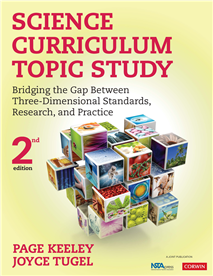All NGSS resources
Blog Post
Improving Elementary Science Programs Through Professional Learning Communities
“I’m not good at science.” It’s a declaration that far too many students have made in classrooms. Their beliefs are often based on lack of exposure to science, not their true potential to do science. So how do we change their minds and get th...
By Edel Maeder
NSTA Press Book
Scientific literacy for all students requires a deep understanding of the three dimensions of science education: disciplinary content, scientific and engineering practices, and crosscutting concepts. If you actively engage students in using and apply...
By Page Keeley, Joyce Tugel
NSTA Press Book
Matter and Energy for Growth and Activity, Student Edition
How do our bodies manage to heal wounds, build the stamina to run marathons, and give us the energy—even while we’re sleeping—to keep us alive and functioning? Matter and Energy for Growth and Activity prompts high school students to explore fa...
By AAAS/Project 2061
NSTA Press Book
Matter and Energy for Growth and Activity, Teacher Edition
How do our bodies manage to heal wounds, build the stamina to run marathons, and give us the energy—even while we’re sleeping—to keep us alive and functioning? Matter and Energy for Growth and Activity prompts high school students to explore fa...
By AAAS/Project 2061
NSTA Press Book
Instructional Sequence Matters, Grades 3–5: Explore Before Explain
Instructional Sequence Matters, Grades 3–5 is a one-stop resource that will inspire you to reimagine how you teach science in elementary school. The book discusses two popular approaches for structuring your lessons: POE (Predict, Observe, and Expl...
By Patrick Brown
Blog Post
When informal science institutions (ISIs) offer professional learning opportunities to teachers to support science in schools, they create the potential for dynamic science educators and classrooms that can support high-quality science learning for s...
By Dr. Vanessa Lujan
NSTA Press Book
It's Still Debatable! Using Socioscientific Issues to Develop Scientific Literacy, K–5
It’s Still Debatable! encourages scientific literacy by showing you how to teach the content and thinking skills K–5 students need to explore real-world questions like these: • Is football too dangerous for kids? • Do we need zoos? �...
By Sami Kahn
Blog Post
Arguing From Evidence to Discover the ‘Why’
In my science classroom, students look at evidence all the time. Sometimes it is in photos or videos; sometimes in charts and graphs; and sometimes we generate our own data through investigations. A more traditional approach previously used is asking...
By Rebecca Schumacher
Blog Post
Journal Article
Crosscutting Concepts as Productive Ways of Thinking
Tips and techniques for creative teaching ...
By Vicente Talanquer
Blog Post
Designing Engineering Projects That Teach Science Concepts by Cory Culbertson
Lately I’ve been thinking a lot about the engineering projects in my courses. On the surface, they don’t seem like something I need to worry about. My students love these projects and talk about them all year. My administration likes the student-...
By Cory Culbertson





